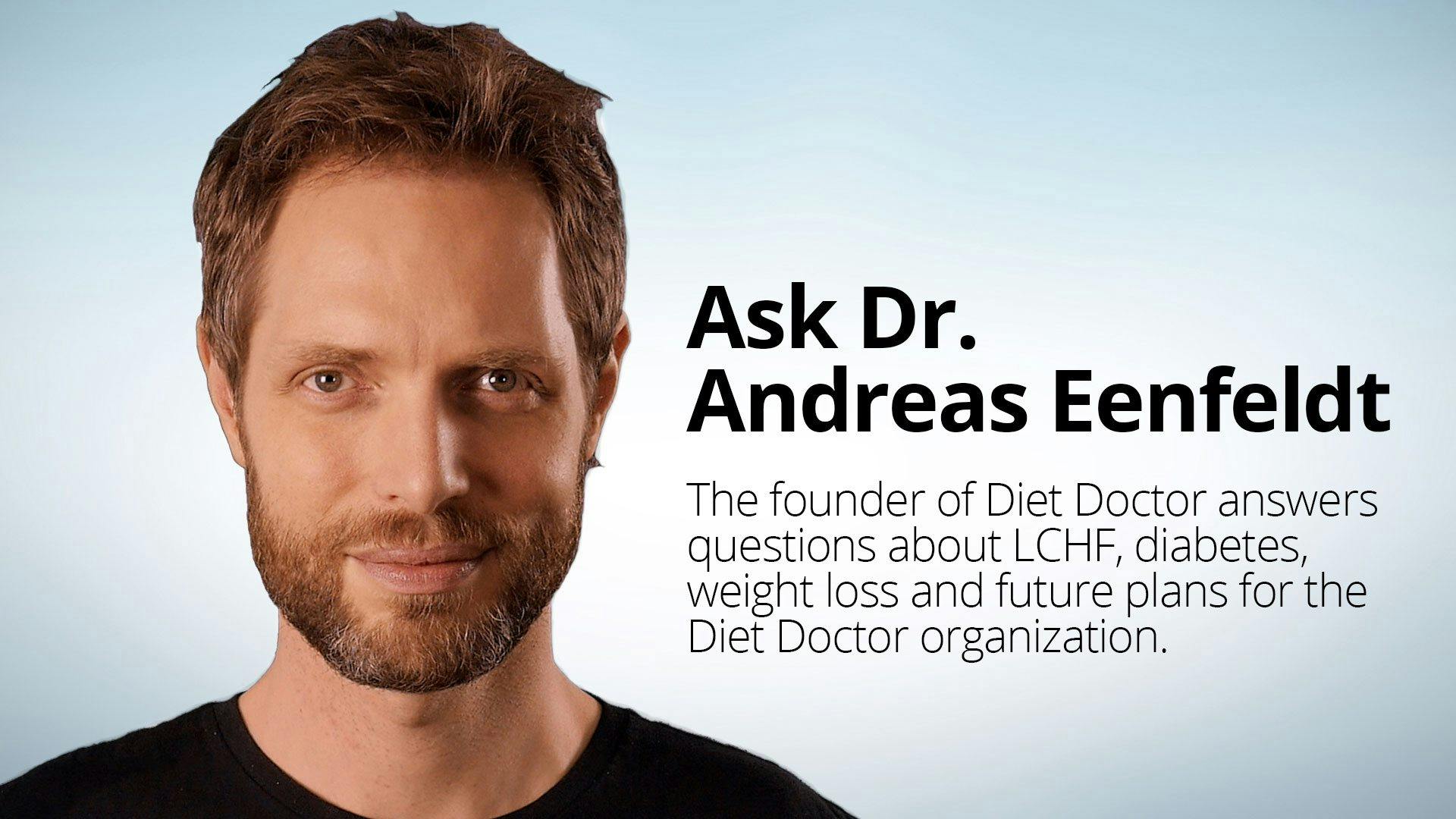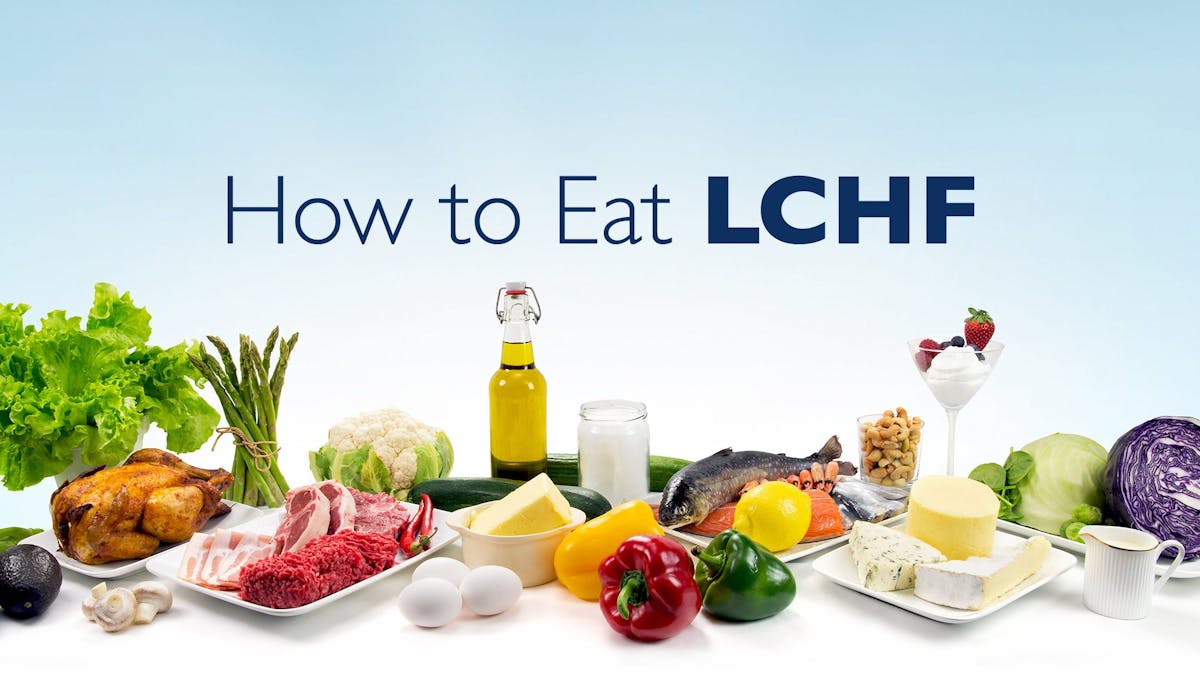
What if weight loss is slow and you know that insulin causes fat storage? Is there then a way to know that insulin is low to make sure that you lose weight?
The answer to his and other questions – for example, how do you know if you’re eating enough fat? – in this week’s Q&A with Dr. Andreas Eenfeldt:
I want to lose weight – how do I know that insulin is low?
Dr. Eenfeldt,
I just viewed the interview you had with Dr. Ted Naiman, who says that high insulin causes weight gain. How do you measure that? I have been on this diet for about 2 months now and have only lost 6 lbs. Despite that I am motivated to continue because I feel much better. While I don’t have diabetes I’m sure I have insulin resistance as I’m about 40 lbs overweight. I have been measuring both my glucose and ketone levels since early June. My glucose levels are between a low of 4.8 and a high of 6.1 and ketones are from 0.4 to 2.4. I fast from dinner to noon the next day, every day as my hunger is satisfied. But I still want to lose weight! Any suggestions? Thanks for your great site.
Barb
Hi Barb,
If your ketones are between 0.4 – 2.4 it’s safe to say your insulin is NOT high, probably it’s quite low.
I’d suggest to keep doing what you’re doing and you should lose more excess weight. LCHF + IF is a very powerful combination. As your weight loss has been slightly slow I’d also check this list of things to see if there’s one or two other things you could do to speed it up:
Best,
Andreas
High blood glucose readings after quitting medications on LCHF + fasting – what should I do?
Dear Andreas
Thank you for taking the time to read my message.
I have encountered irregularities that I did not see on anyone in the same community mention.
My blood glucose was giving 230 in June 2015 when I started low-carb diet while maintaining my 2 medications (Janumet & Ivokana 300). 10 days later my blood glucose normalised averaging below 100. By Feb 2016 I lost about 10 kg (22 lbs) and my A1c dropped from over 9 in June 2015 to 5.9 in Feb 2016 while maintaining the same medications. Wonderful news & achievements.
Around March 2016, watching Dr. Jason Fung suggesting fasting as a therapy for reversing DT2 with turbo effects in comparison to low-carb diet and taking into consideration Megan Ramos recommend fasting as a therapy to reversing DT2 & to eliminate medications use,
I started in May 2016 fasting and with the terrific achievements of more weight loss and lower daily readings I moved to stop both medications from May 15 2016.
Things went well for just one week. After the dawn effect triggered. Daily high glucose reading started going as high as 200 during early morning hours only to come down to 110 or below by end of the day. Dr Jason Fung suggested it is ok as long as A1c is within acceptable range. I went on for 2 more weeks while my a1c1 becoming fantastic at 5.6 within range for a first time since a year without seeing an end to the dawn effect and got worse in early June 2016 to having high glucose readings exceeding 200 all day for several repeated days. I then decided around 12 June that having high glucose readings for more than a week and my a1c1 increasing to 6.8 may be dangerous to my heart and decided to introduce one of my old medications and thought to introduce only Ivokana as a start to control high glucose readings because I thought it works better & less harmful than Janumet by sending glucose out of my body by urine through my liver. 3 days later glucose readings became within acceptable range and as of 15 June, I am back on no medications while maintaining glucose readings within normal range since one week.
Do you have any comments to how it should go next?
Regards
Emile
Hi Emile,
Congratulations on your success. With the benefit of hindsight you were clearly not ready to stop all medications (3 different drugs as Janumet is a combination drug) when you did, and that is likely why your blood sugar shot up high again.
It was simply too big a change at one time.
If you’re now off drugs and blood sugar still stays within normal: congratulations, that sounds very promising. Obviously, you should discuss it with your doctor but it may very well be that you now don’t need these drugs any longer, as long as you keep up your lifestyle choices.
Best,
Andreas
Should I follow a ratio to make sure that I’m getting enough fat?
Hi Andreas, I have been doing a lot of reading about the LCHF way of eating/dieting. One question remains that I have not seen mention of. Some proponents say there should be a per cent of fat intake or ratio of fat to protein that I don’t understand how to figure. It seemed important enough to mention in several books I have read. I am not feeling confident about “eat when I’m hungry” or being able to notice my body telling me I have had too much fat, or not enough fat, etc. Can you help me with understanding this better?
Cindy
Hi Cindy,
I believe this is overcomplicating things a bit. Also it can lead people to add more fat even without being hungry, in the mistaken belief that it will help them lose weight. Only eat fat until you’re satisfied and feel good and full – and then wait until hungry again.
It may be hard at first to know what is enough – but it’s a skill most people can (re)develop.
Best,
Andreas
More
More Questions and Answers
Many more questions and answers:
Read all earlier questions and answers – and ask your own! – here:
Ask Dr. Andreas Eenfeldt about LCHF, Diabetes and Weight Loss – for members (free trial available)
More About LCHF and Diabetes




The post Q&A: How Do You Know if Insulin Is High or Low? appeared first on Diet Doctor.
http://www.dietdoctor.com/insulin-blood-glucose-after-quitting-meds-and-fat-ratios
No comments:
Post a Comment